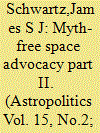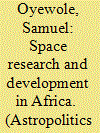| Srl | Item |
| 1 |
ID:
154949


|
|
|
|
|
| Summary/Abstract |
The February 2003 loss of the space shuttle Columbia on mission STS-107 was a mishap that stunned both NASA and the world. This research examines the pre-NASA and post-NASA decision-making modalities and risk acceptance behavior for the safe and reliable operation of the space shuttle through the lens of hazard analysis. Interviews with NASA administrators and senior Space Shuttle Program managers bring back to life their views from the 2003 through 2005 timeframe, during which NASA returned the space shuttle back to a flight status. Lessons from their effort have broad applicability to other organizations recovering from—and attempting to prevent—a major accident.
|
|
|
|
|
|
|
|
|
|
|
|
|
|
|
|
| 2 |
ID:
154953


|
|
|
|
|
| Summary/Abstract |
We discuss an experiment employing participatory technology assessment (pTA), a public deliberation method for eliciting lay citizen input prior to making decisions about science and technology to inform upstream engineering decisions concerning technical aspects of NASA’s Asteroid Initiative. In partnership with NASA, the Expert and Citizen Assessment of Science and Technology network conducted a pTA forum on NASA’s Asteroid Initiative in 2014. The goal of the exercise was to assess citizens’ values and preferences about potential asteroid detection, asteroid mitigation, and exploration-based technologies associated with NASA’s Initiative. This article discusses the portion of the forum that focused on the Asteroid Redirect Mission, an effort to redirect an asteroid into lunar orbit that astronauts can study. The forum sought public input on two options for performing the mission that NASA included in technical assessments to make a down select decision: Option A to capture a 10-meter-diameter asteroid; or Option B to redirect a several-meters-diameter boulder from the surface of a larger asteroid. We describe the values and perceptions participants had about Option A and B, how these results were used by NASA managers, and the impact the results of the pTA had on the down select.
|
|
|
|
|
|
|
|
|
|
|
|
|
|
|
|
| 3 |
ID:
154959


|
|
|
|
|
| Summary/Abstract |
Space advocates commonly compare the settling of the “space frontier” to the settling of the “western frontier” in the United States, arguing that space settlement will realize the same benefits purportedly realized by the western expansion of the United States: the generation of new cultures; the development of new technologies; and the empowerment of democratic governance. However, much of the reasoning here is based on a faulty understanding of history and on an overly optimistic view of what it will be like to live in a space settlement. Thus, I argue that ardent faith in the promises of settling the space frontier is a mythological belief, rather than a well-confirmed one.
|
|
|
|
|
|
|
|
|
|
|
|
|
|
|
|
| 4 |
ID:
154962


|
|
|
|
|
| Summary/Abstract |
Africa is advancing in research and development (R&D) in space with a growing investment in satellites for communications and Earth observations, astronomical observatories, space launch vehicles, and ballistic missiles. These efforts are designed to develop capacity in space science and to advance human development and security in Africa. Nevertheless, there are emerging concerns within and outside the continent on the cost of R&D in space and the public priority it is receiving, given developmental priorities in Africa. This article examines the state of space-related R&D in Africa, its cost and benefits, and the imperative for a balanced policy priority and investment. Leading African states are encouraged to intensify international partnerships, internalize relevant know-how, improve their competitiveness, and support regional initiatives to minimize the domestic cost of spreading benefits of space technology across the continent.
|
|
|
|
|
|
|
|
|
|
|
|
|
|
|
|